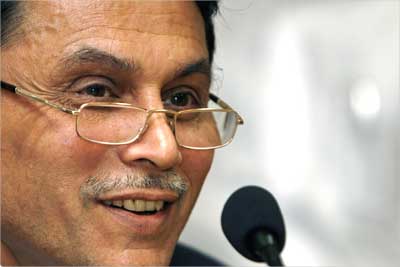Photographs: Reuters A K Bhattacharya
The stock market's excitement over the public issue of state-owned Coal India Limited is understandable. It is the biggest initial public offer aimed at garnering about Rs 15,000 crore (Rs 150 billion) for the country's largest coal mining company, accounting for over 80 per cent of the domestic market.
Indeed, Coal India's current production and reserves make it the world's largest coal mining company. Its cost of producing coal is also the lowest in the world.
The buzz about the initial public offer, however, has another reason.
Coal India chairman Partha Bhattacharyya has made several statements on the company's bright prospects and the new projects his company plans to undertake in the next few years. Even Coal Minister Shriprakash Jaiswal has not refrained from making rosy forecasts for Coal India in the last few days.
Nothing unusual in what the Coal India chairman and his minister were doing, except that their statements coincided with the launch of Coal India's public issue.
. . .
How a PSU in India enjoys special privileges
Photographs: Reuters
Going strictly by the rulebook, what they have been doing in the last few days would have raised the eyebrows of the markets regulator.
Of course, both the Coal India chairman and the minister may seek refuge in the alibi that they did not say anything that had not already been mentioned in the prospectus issued for raising money from the market.
Technically they are right, but there is no denying that the tenor of those statements will always remain questionable.
No chief executive of a private sector company will make any forecasts or promises concerning his company at around the time it is raising capital from the market through a public issue.
Even if those forecasts were part of the prospectus, the company management would refrain from repeating them through an announcement, just to prevent the markets regulator from taking some punitive steps that might affect the smooth conclusion of the public issue.
. . .
How a PSU in India enjoys special privileges
Photographs: Reuters
They may do many other things to prop up the issue, but will never lend their names to an announcement that paints a rosy picture of the company.
If the markets regulator has not yet sent an advisory note to Coal India on its chief executive's frequent announcements in the media, it is probably because it is a public sector enterprise.
That is the public sector advantage in India. A public sector enterprise in this country still enjoys special privileges.
Remember the markets regulator's insistence on enforcing Clause 35 of the agreement for listing of companies with the stock exchanges! The amended clause insisted that non-promoters should hold a minimum of 25 per cent of a listed company's shares.
For public sector companies, this was a difficult condition to meet. Many of them were listed, but had less than even 10 per cent of their stocks held by non-promoters.
. . .
How a PSU in India enjoys special privileges
Photographs: Reuters
Nobody complains about the public sector enterprises' failure to meet that condition any more. Even though Coal India will offload only 10 per cent of its stocks through its initial public offer, it will be well short of meeting the listing guidelines.
No uncomfortable questions will be asked. That is another example of the public sector advantage in India.
Then there was the Unit Trust of India, which got embroiled in a deep financial mess almost a decade ago. The government bailed it out. Once again, the Unit Trust of India benefited from the public sector advantage.
To be fair, there are public sector disadvantages also. Take, for instance, the state-controlled oil companies. In 2002, the government decided to give them the freedom to fix prices of petroleum products. That freedom, however, was only on paper.
In practice, these companies would seek the petroleum ministry's clearance before effecting a change in the price of petroleum products. By 2004, they had lost whatever freedom they got in 2002.
. . .
How a PSU in India enjoys special privileges
Photographs: Reuters
In the name of protecting the common man, the government decided it would not allow any increase in petroleum product prices even though the oil companies would incur huge losses as a result of the rise in international crude oil prices.
The government would compensate their losses, but there would be delays and uncertainty. The situation has improved somewhat since June this year, but each one of these state-controlled oil companies will tell you how badly it suffers from being a public sector enterprise.
It is difficult to miss the larger point. Twenty years after the launch of economic reforms and several other economic liberalisation measures, India's public sector continues to operate under a special dispensation.
There are some exceptions. However, most of them seem to enjoy the public sector advantage and a few like the oil companies suffer from the disadvantages of being state-controlled companies.







article